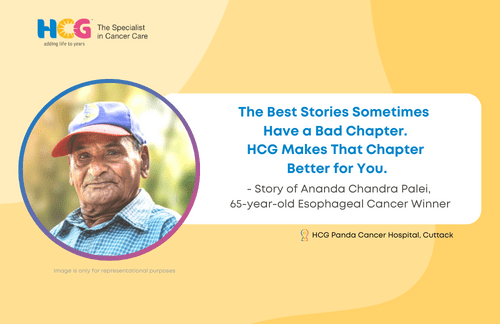
23 Sep, 2022

23 Sep, 2022
Story of Ananda Chandra Palei, 65-year-old Esophageal Cancer Winner
Have you ever heard the saying, "When life gives you lemons, make lemonade"? This is a common phrase when things are difficult. Cancer is a challenging experience for patients and their loved ones to deal with. However, very few realise that it is possible to treat cancer successfully, and patients can go on to lead a normal life after treatment in most cases. To throw some light on the importance of timely treatment and how certain habits of ours can increase our cancer risk, we are bringing you the story of 65-year-old Ananda Chandra Palei, who was recently treated for esophageal cancer at HCG Panda Cancer Hospital, Cuttack.
When Ananda Palei visited HCG Panda Cancer Hospital, he had swallowing difficulties (dysphagia) for 6 months, vomiting for 4 months, and stomach pain, chest pain, and cough for 1 month.
While studying his medical history, the doctors found that he had been consuming paan for the last 30 years. However, he had no comorbidities.
Various tests like upper GI endoscopy, PET/CT scan, CECT scan, and endoscopic biopsy were carried out to arrive at an accurate diagnosis. Eventually, it was found that the patient had mid-esophageal cancer (moderately differentiated squamous cell carcinoma).
At HCG Panda Cancer Hospital, we have highly experienced oncologists, who carefully devise treatment plans upon considering various factors like the type of cancer, its stage, exact location and size, the patient’s age, and their overall condition.
In Ananda Palei’s case, doctors thoroughly assessed his condition and his medical reports and decided that he would require multimodal treatment comprising chemotherapy, surgery, and radiation therapy.
Three cycles of chemotherapy were intravenously administered before the surgery to shrink the tumour size and reduce the risk of micro-metastasis.
During preoperative diagnosis, the disease was found to be locally advanced. Experienced surgical oncologist, Dr. J R Swain and his team at HCG Panda Cancer Hospital, proposed a surgical management plan (after completion of preoperative chemotherapy) that involved transthoracic 3 phase total esophagectomy (removal of the esophagus), gastric pull-up (reconstruction of damaged esophageal tissue), and stapled esophagogastric anastomosis (restoring the digestive tract).
Adjuvant radiation therapy was recommended after surgery to destroy the residual cancer cells and help the patient achieve remission. Ananda Palei showed excellence tolerance to the treatment.
The treatment was successful, and Ananda Palei is currently under follow-up care and is doing well.
Paan consumption is more common in eastern India. It contains tobacco as one of the key ingredients, along with areca nut and betel leaf. Multiple studies have found that tobacco contains some of the most harmful carcinogens, and its consumption can increase the risk of more than 15 types of cancer. Recent studies have found that consumption of areca nuts and betel leaves is also associated with an increased risk of oral cancer.
When it comes to the association between paan consumption and esophageal cancer risk, various studies show that smokeless tobacco consumption is one of the biggest risk factors for esophageal cancers.
Several studies have shown that quitting smoking can reduce the risk of esophageal cancer. Therefore, it is important for tobacco consumers to become aware of this harmful habit and quit it.
We often observe that tobacco consumers find it hard to quit tobacco due to the presence of nicotine in it, which is a highly addictive substance. To help such individuals, tobacco cessation programmes are available. Tobacco cessation specialists use evidence-based and reliable coping strategies to help patients quit tobacco and live a healthy life.
Continual research over the years has certainly increased our understanding with respect to the diagnosis and management of esophageal cancers, and we are able to treat this condition better than ever. Nevertheless, it is important for these high-risk individuals, along with low-risk individuals, to follow the right measures to reduce the risk of esophageal cancer and be mindful of the possible symptoms.